Eggs Scrambled In Tomatoes (Strapatsada)
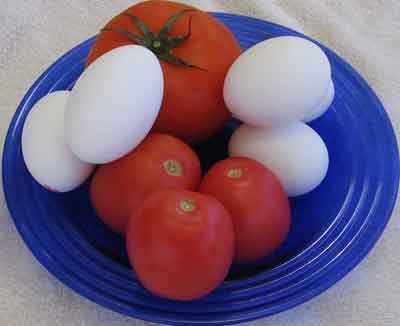
The name of this dish betrays its Italian origins. It comes from parts of Greece closest to Italy – the western Peloponnesos and the Ionian. This is a family recipe of Zoe’s father, and he made it often. As with so many Greek dishes, it is surprisingly simple given the flavor punch it delivers. Speaking of flavor, it is also surprisingly sweet. I don’t know why.
Ingredients
1 1/4 lb tomatoes, grated or pureed in a food processor.
5 eggs
6 TB olive oil, good quality if you’ve got it, because it flavors this simple dish
salt and pepper
Cook It!
Heat the olive oil in a frying pan over fairly high heat and add the tomatoes.
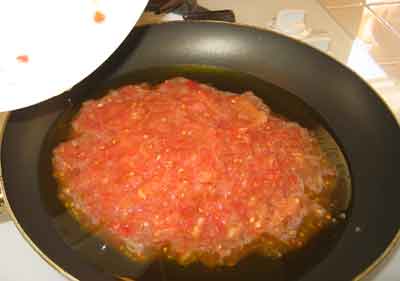
Add salt and pepper to taste. For this amount of tomato I put in approximately 1/2 tsp salt and 1/4 tsp pepper. Stir the tomatoes so they’re well mixed into the oil. Cook the tomatoes, stirring frequently, until their liquid has evaporated, approximately 10-15 minutes.
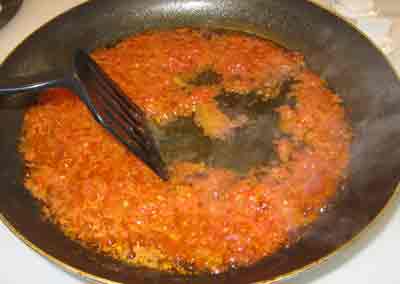
Meanwhile, crack the eggs into a bowl (you can use the bowl the tomatoes were in). Sprinkle the eggs with salt and pepper, then beat them with a fork. When the tomato liquid has evaporated, pour in the eggs.
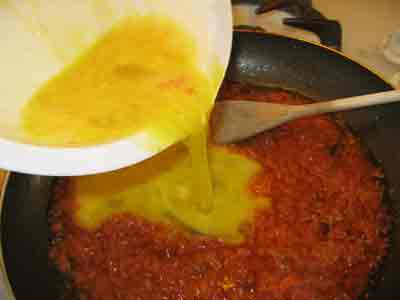
Turn the heat down to medium low and stir the eggs into the tomatoes. Cook and stir frequently, until the eggs have set and “drunk the liquid,” about 20 minutes.
Before we proceed to further steps and photos, we’d better get one issue out of the way. This is not a visually attractive dish. In Zoe’s words, it looks like “orange throw-up.” Just thought I should warn you. Mama won’t even eat it because of the visual effect. Too bad, because it’s delicious!
Okay, back to stirring.
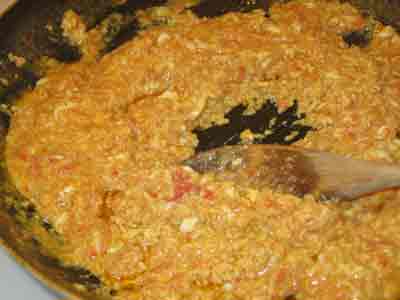
After each stirring, spread the egg mixture out in an even layer that covers the whole pan, this way it will cook evenly.

Eventually, the eggs will be firmly set and will have absorbed all the liquid.

Serve with bread and feta.
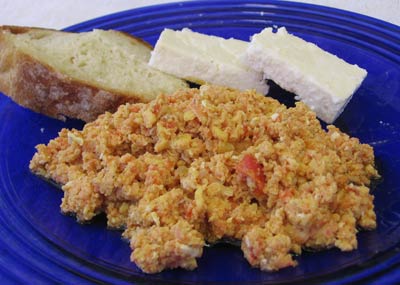
Note: I’ve given ingredient amounts that will make a hearty meal for two, but you can make any quantity that you want. The basic proportion is two eggs per one large tomato. Salt and pepper to taste. And don’t skimp on the olive oil!
UPDATE: One of the commenters below has steered me to another recipe for strapatsada, at Kalofagas, which you might like to check out. Related to that, the question has arisen as to whether strapatsada is of Italian origin or Sephardic origin. Well, heck, I don’t know! I probably shouldn’t have spent time googling it, but I did, and I found this:
The Greek cookery writer Rena Salaman mentions that the word for this dish used in Corfu – strapatsatha – comes from the Italian verb strapazzare, meaning to beat.
You can read the rest, an informative article about Greek food, that includes yet another strapatsada recipe in The Guardian, Life and Style.
Comment by Peter G
Another favourite Lulu! Admittedly it doesn’t look the best but it does taste phenomenal. I love it over bread and even eat it cold. I imagine the sweetness comes from the tomatoes. A great step by step guide.
Comment by Lulu
I’m sure you must be right about the tomatoes, Peter. Hey, putting it over bread sounds really good to me. But then if you give me bread I always try to do some sort of sandwich.
Comment by maria verivaki
peter’s right about it not looking particularly beautiful, but it is a favourite summer dish. we also add thin slices of zucchini into it
maria verivaki’s last blog post..Kleftiko
Comment by Lulu
That sounds like a good way to up the veggie content of the meal, Maria.
Comment by Sam Sotiropoulos
Lulu, can you perhaps tell us what “Strapatsada” means in Italian?
Sam Sotiropoulos’s last blog post..Grilled Eggplant Salad
Comment by Cheryl
It isn’t visually attractive but it is delicious. It’s funny because SIL is always talking about food and how it looks. She refused to try refried beans in the U.S. saying that they reminded her of…well…I’ll let you guess! But, I love my beans no matter what they look like!
Cheryl’s last blog post..Tomatoes for Sale!
Comment by Lulu
@Sam – Yes, it means, “that egg and tomato scramble that we taught to the greeks.”
Seriously though, I just tried googling it and running it through babelfish without finding anything. For all I know it could be a bastardized word as opposed to an actual Italian word, and even it if it is Italian, who knows exactly how it’s spelled.
Comment by Lulu
@Cheryl – Never thought before about how refried beans look. I think if you look for gross things to compare your food to, you can really miss out on a lot of good food. Of course, I say that as someone who’s almost impossible to gross out, so I probably just don’t have the delicate, sensitive nature needed to properly understand this problem. 😛
Comment by Sam Sotiropoulos
@Lulu Well, thanks for doing some homework, too bad there wasn’t anything conclusive because Peter Minakis, who is from Thessaloniki area on the east cost of Greece thinks the Jews taught the Greeks how to make this dish, see: http://kalofagas.blogspot.com/2008/03/strapatsatha.html
So, as you can no doubt understand, I am a little confused by the diametrically opposed accounts you and Peter have provided.
Comment by Lulu
Sam, I’ve done a bit more googling and gotten some more information. See my update at the bottom of the post above.
Comment by Sam Sotiropoulos
Excellent. Thank you Lulu. My own research has pointed in quite another direction altogether (namely that of the Venetian Duchy of the Archipelago of the North Sporades in the western Aegean) but hey, in this wonderful world that we live in, everybody’s opinion counts, right? Perhaps it’s a myth? After all, myths can have contradictory endings.
BTW, do you happen to recall the specific title of Rena Salaman’s book that you cite?
Sam Sotiropoulos’s last blog post..Grilled Eggplant Salad (?????? ???? ?????????)
Comment by zoe
Jews were expelled from Spain in 1492. Columbus discovered the New World in 1492. It’s unlikely that he brought back tomatoes in time for the Sephardic Jews to take with them in exile and introduce them to Greek cuisine.
Lox, is another story…
Comment by Lulu
@Sam – Didn’t you realize I was quoting the Guardian article? Please click the link I provided if you would like to include the article in your research.
@Zoe – Good point, thanks! What about the cream cheese and bagels?
Comment by zoe
We had those too but the Turks stole them and blamed it on the Jews.
Comment by Lulu
@Zoe – LOL!
Comment by Sam Sotiropoulos
@Zoe, LOL! the fact that Columbus did not bring tomatoes back to Europe until 1493 was exactly the point I made to Peter in the comments section of his posting, but he was adamant in his position so I gave up trying to correct him. Sigh.
@Lulu, no in fact I didn’t realize you were quoting the article because I read the posting on my handheld and the screen is quite small and I sometimes miss things because the scroller often moves too quickly.
Sam Sotiropoulos’s last blog post..Grilled Eggplant Salad
Comment by Paula
Yum, Yum, YUM!!! I just love your posts. Oh, Lulu, once again you’ve brought forward another childhood memory. You may recall that my mom was Southern Italian, and I ate this growing up! Most of the time, we would just push the tomato aside from the center, and crack an egg right into the center of the pan and fry it or scramble it. Once the egg was cooked, we’d then spoon the tomato over top and sprinkle with pecorino. I can’t wait to try it with feta! Oh man, now I’m hungry.
Paula’s last blog post..Olympic Stir Fry 2008
Comment by Lulu
Paula, it’s so great to hear that! What did your family call this dish? Do you know the Italian name for it?
Comment by Sam Sotiropoulos
@Lulu Quick question: Did you get my latest facebook message?
Comment by Paula
Hi Lulu! We simply called it “Uova al Pomodoro” which loosely translates to Eggs with Tomotoes. I love, love, love it. Guess what I wanted for breakfast this morning?!!! YUM!
Paula’s last blog post..Olympic Stir Fry 2008
Comment by Ivy
This is one of my favourite summer dishes. In Cyprus we just call it tomates me avga but in Peloponese it is called kagianas. Although I have read all the comments I have not seen this mentioned anywhere. Unfortunately I do not have any information about it’s origin.
Comment by Lulu
@Paula – It’s always good to enjoy old favorites. Thanks for the name!
@Ivy – Thanks for the info! Are you back from your vacation?
Comment by Sam Sotiropoulos
@Ivy LOL! yes, Kagianas… I was preparing that as a little surprise for all the Greek food experts who know our food better than we do ourselves. 😉
Comment by Sam Sotiropoulos
Say Lulu, would you mind changing the link to my blog in your blogroll to read “Greek Food Recipes and Reflections” (without the quotes) as that is the actual title of the blog. I don’t want to have it confused with the Greek Gourmand site proper which is under development. Thank you!
Comment by Lulu
Hey Sam,
Yay! I finally get an answer to the question I asked you four months ago on your Queen Elizabeth post:
____________________________________
April 19, 2008 1:17 PM
Lulu said…
Thanks for the tip about the moussaka, Sam. At my house we have a tendency to dive headfirst into the pan as soon as it comes out of the oven. Perhaps if someone stands guard….
By the way, I used the title of your blog in my blogroll: “Greek Food – Recipes and Reflections”. Is that what you prefer, or would you prefer “Greek Gourmand”?
____________________________________
Since you never answered, I shortened it up to fit better in my side bar. I’ll change it back when I get the chance. I’m sorry, but I’m super busy with work right now and my dog is sick so I’ve had to be ruthless about streamlining my online activities. I’ve got to go, I’ll try to get to it soon.
Comment by Sam Sotiropoulos
Sorry to hear about your dog. Hope it all works out. As for the change, I thought I remembered answering you way back when, to list the name as I requested. Must have slipped my memory as I am sure I intended to… In any case, get to it as you can but don’t bend over backwards or anything like that; if necessary, I can always remind you again (and likely will) just to make sure it is done. Thanks for taking the time to answer this request.
Hope it all works out. As for the change, I thought I remembered answering you way back when, to list the name as I requested. Must have slipped my memory as I am sure I intended to… In any case, get to it as you can but don’t bend over backwards or anything like that; if necessary, I can always remind you again (and likely will) just to make sure it is done. Thanks for taking the time to answer this request. 
Amiably,
Sam
Comment by zoe
@21 Ivy, in Peloponnisos (at least the western part) it’s called strapatsada, I never heard of “kagianas”.
@23 Sam
It’s thanks to these experts that our moms’ and grandmas’ recipes are online and available to everyone. I for one, am grateful to see non-Greeks cook and eat like Greeks and we should encourage their effort rather than being snarky about it. Not many philhellenes out there, the ones we find we should treasure
Comment by zoe
A question for any Cypriots on this blog: I once had a lovely rose liqueur made in Cyprus. Does anyone have a recipe for rose liqueur?
Comment by Sam Sotiropoulos
@Lulu, oh Lulu, but you are a treasure! Indeed. I wonder that you even have the time to lecture on such topics but not to change a simple link’s name in your blogroll… In any case, I appreciate your sentiments, I encourage non-Greeks to eat like Greeks all the time. It is just that when people start making questionable statements and are obviously only partially informed on a related topic, I think it is necessary to make sure we are thorough and make all the relevant information available to allow people to come to their own conclusions. As for being snarky, that’s a judgement call and you are free to make it. Now, rather than answer this post and take valuable time away from your sick dog and busy work schedule, I’d greatly appreciate it if you went through the very simple exercise of changing the link name as I have now requested no less than three times. Thanks a lot.
Comment by zoe
@29 Sam,
I’m the one who wrote that comment, not Lulu. I don’t know what you mean about “questionable statements” or being “partially informed” but blogs are certainly a great medium for exchanging information and learning in a positive and helpful manner.
And speaking of judgment calls, I will make another one and say that your tone and attitude about demanding that the blog owner change the name of your blog *right now* because you have requested it “three times” is rude, to say the least. From Lulu’s comment #25 it’s clear that she had asked you about your blog’s name before and you didn’t respond but now it’s become urgent for you and she has to jump to it?
Filika,
Zoe
P.S. As afisoume tous kavgades ki’as kapnisoume tin pipa tis eirinis, ti les?
Comment by Sam Sotiropoulos
Well, if you (zoe) and not Lulu wrote it, you must have also been the person who received my private message in facebook regarding the issue of the link name change. Then, you must also have been the one to respond to me privately again in facebook (again as Lulu) on the matter which you (zoe) then saw fit to publish that private exchange (as Lulu) in the comments section of Lulu’s blog. Pardon me for asking, but does “Lulu” even exist?
As afisoume tis eksypnades kai ola patsi, esu ti les
Comment by Sam Sotiropoulos
@Zoe/Lulu/Whoever The “questionable statement” I referred to is the claim that the dish known as Kagianas in Arcadia and Laconia, a dish Lulu/zoe admitted to never having heard of, is actually something the Greeks picked up from the Italians… that is questionable and is open to questions esp. considering what myself, or Ivy, or others may know that you/Lulu/zoe do not. I hope that clears it up for you.
Comment by Sam Sotiropoulos
Ok… this comment system renders VERY BADLY on my Blackberry phone… I have just sat down at my computer and seen that zoe and Lulu remain distinct personas in the discussion thread (my woops!), apologies for mixing that up. All of my other points stand as delivered. Take care.
Comment by zoe
@Sam,
I’m not sure what you mean when you say
We’re not personas, we’re actually two distinct people in the real world. For the record, I am not Lulu, I don’t use Facebook, I didn’t read your private messages–where the hell would I read them?–and I’m not anyone’s sockpuppet. I was referring to your comments here, in this thread. In your own words:
Then I read Lulu’s comment (in this same thread):
By the way, I don’t see how the above is a “private exchange” since Lulu published what Lulu herself wrote. She didn’t publish your reply or any of your emails or your private messages, only what *she* wrote to you. Her intellectual property, so to speak.
Then I read your next comment, again here in this thread, not in facebook, not in private message:
And I told you how rude your behaviour was towards the blog owner who happens to be your host here. It is my opinion, as a commenter. I’ve read Lulu’s blog before but this is the first thread I commented on, because I found the theory that Sephardic Jews brought tomatoes to Greece unlikely and I expressed my doubts. This had nothing to do with you. However, when I checked the thread again later, I couldn’t help but notice your unnecessary and uncalled for snarkiness and hostility and I brought it to your attention. But instead of apologizing for being rude and hostile to your host (not me, I’m not her) you went on accusing her of being me or me being her. Whatever. Nice that you apologized about your confusion over people’s identities, too bad about the rest of your behaviour.
Comment by Sam Sotiropoulos
I have nothing to apologize for. If Lulu has time to post our private messages in facebook to the public comments section of this blog, then she has something to apologize for, not me. For, in the time she took to post that private communication to a public comment board, she could have changed every single link name in her blogroll and not just my own. So thanks for your unsolicited remarks on a matter which should have remained between myself and Lulu.
Comment by zoe
Sam,
If this matter should have remained between yourself and Lulu, then you shouldn’t have brought it up on a public blog for the whole world to read. In case you forgot, you’re the one who brought it up first:
From everything I read in this thread, Lulu didn’t post *anything* written by you, she only posted her *own* words. Are you saying she should have asked your permission to post on her own blog what she wrote? Not that I would be surprised, since you seem to think that she should also arrange her day and her schedule and her priorities around changing your link in her blogroll. Who cares if the dog is in agony and the boss wants the work project finished by yesterday, Sam’s blog name needs to be changed!
Comment by Sam Sotiropoulos
The only reason I brought it up was because I received no response from her *in* facebook when I sent her my original request the other day. In the meantime, she was posting responses (see comment 22) to others here on the comment list, but avoiding my simple question to her back in comment 19:
————————
19. Comment by Sam Sotiropoulos
@Lulu Quick question: Did you get my latest facebook message?
————————
So, once more, thanks for your unsolicited remarks.
Comment by zoe
Hint: If you don’t want unsolicited remarks you shouldn’t be posting on public blogs.
Comment by noobcook
I think this is the most exotic, but delicious way of making scrambled eggs I’ve ever come across 😉 nice!
Comment by History of Greek Food
Hi Lulu,
1) Kagianas or kaykanas or kayganas (East Crete, Laconia, Arkadia, North. Greece, Greek Jews, Greeks from Minor Asia etc.) is a sweet or savory dish made of eggs. It can be shaped in the form of scrambled eggs or omelet. The word derives from the Ottoman Turkish (kaygana) but is of Persian origin. Turks and Greeks know various ways of making kaykana: with cheese, vegetables, greens, fishes, preserved meat, nuts, honey, sugar etc. The Pontic foustoron and the Jewish fnaro are also kaikanades.
2) Strapazzada comes from greek ?????????, which derives from ital. strapazzo (See ital. uova strapazzate an extremely tasty dish from Italian cucina povera.) Until recently this egg dish was called strapazzada only in Ionian islands and parts of Western Peloponesos. In the rest of Greece was called kaykanas or simply ‘eggs with tomatoes’ (???? ?? ????????). However, a strapazzada with preserved pork is always called kaykanas or kagianas.
3) ‘The tomato was introduced to Greece in 1818, by Friar Francis. He cultivated some plants in the garden of the Capuchin monastery at the Monument of Lysicrates in Athens.’: http://www.historyofgreekfood.com/?p=22. Thus it cannot be introduced by Jews.
History of Greek Food’s last blog post..SEE YOU IN OCTOBER
Comment by History of Greek Food
Sorry, the ???? is ‘strapatso’ and ‘avga me ntomates’.
History of Greek Food’s last blog post..SEE YOU IN OCTOBER
Comment by Bellini Valli
I am more interested in if it tastes good than where it comes from or who thought of it first….and it sure does:D
Bellini Valli’s last blog post..Mini Greek Meatballs for Taste & Create
Comment by RennyBA
Never heard of it, but it looks really delicious and what a readable post – thanks for showing us, step for step!
RennyBA’s last blog post..Evening out with old friends in Oslo
Comment by Lulu
@39 noobcook and @43 RennyBA – Let me know what you think if you do try it!
@41 & 41 History of Greek Food – Thanks for the info – detailed and scholarly as always!
@42 Val, yep, me too!
Comment by Teresa
Lulu, I just want to say I don’t care where it came from, this dish sounds delicious!
Teresa’s last blog post..Open Faced Calzone
Comment by Lulu
Hi Teresa! It is!
Comment by maria verivaki
go lulu!
maria verivaki’s last blog post..Vegetable chips and fritters
Comment by Kiki
My late grandfather came from a village in the mountains of Nafpaktos. This is one of the dishes he taught me to make as a kid, only he added feta in at the end, just to melt it a little, then finished with pepper . So simple and just scrumptious – I just love this dish, although it does require getting over the not-so-great smell while it’s cooking… the taste is worth it!
Comment by Lulu
Hi, Kiki, welcome! There’s nothing better than family recipes/memories; thanks for the sweet story.
Comment by Iosifina
Strapatsada! My father in law in Thessaloniki made this dish; however, he often put other leftover in the mix, even diced raw potatoes. He fried the potatoes and onions, added tomatoes, then the eggs. YUMOLA!
Comment by Lulu
Hi, Iosofina, welcome! Potatoes and onions sound like they would be really good in this!
Comment by FoodJunkie
Hello Lulu,
I am back only to discover that your blog has become a battlefield! Anyway, I stayed in Sparti for a while (Southern Peloponnese) and they are the masters of kagianas, as they call egges with tomatoes. There is even a famous taverna specialising in it. Anyway, they also include sfela, a haloumi type cheese made on the Tigetus mountain (or fta cheese), and smoked salted pork (pasto xoirino or siglino) they smoke themselves. It is truly yummy that way. And don’t forget to add sugar to your tomatoes. This a a secret that no-one tells you, but it makes a hell of a difference. BTW I was about to post my version of kagianas, but it looked really ugly!
FoodJunkie’s last blog post..An Italian Wedding
Comment by Johanna
Hi Lulu,
I am back and I see that there is a battlefield over here!I posted a comment at your blog but it didn’t show up! Anyway, I lived in Sparta for a while where kayanas is their local speciality. To the eggs and tomato they add sfela, a hard haloumi -style cheese or feta and siglino, smoked pork. The biggest secret though for a good kayanas, which was given to me by my friend’s grandma who lives in a village outside of Sparta is a simple one: add some sugar to the tomatoes..
Johanna’s last blog post..Logia tis ploris
Comment by Lulu
Welcome back Johanna! I love-love-love-d your Italian wedding post! I wanted to comment but I was so stunned by all the deliciously fresh seafood that I had to just close up my computer and go to bed.
Cheese and smoked pork sound awesome as additions to strapatsada/kayanas! I’ll keep in mind the sugar suggestion. I think I haven’t needed sugar so far because the only time I have the inclination to make this is when I have ripe, sweet tomatoes from my garden. But I’m starting to want to make this more often, and obviously I won’t always have such good tomatoes.
You’ve been getting caught in my spam filter lately, I don’t know why. Sorry if I missed out on rescuing one of your comments.
Comment by Lulu
Found your comment, Food Junkie, thanks again for the info!
Comment by Peter
Folks, this discussion on the origins of this dish is way to involved and frankly it’s taking away from the the actual dish. With reference to post on Strapatsatha being introduced to Thessaloniki’s cuisine by the the Jews, I stick by it.
I’m quite aware that tomatoes appeared in Greek cuisine long after Jews settled in Greece. However, the Sephardic dish called “uevos haminados” was brought with them (tomatoes absent).
It’s no great stretch of the imagination that Jews could have adapted the dish to evolve to include tomatoes. This theory has long been held in the area around Thessaloniki.
I’ve said my 2 cents worth and I frankly could care less about debating the origins of the dish further. I will now go and make some “avga Kleftiko”! 😉
Peter’s last blog post..Gone Fishing
Comment by Farmer Jen
I grew up with my own Greek mother cooking this scrambled eggs & tomatoes dish. That’s enough of “origin research” for me.
Farmer Jen’s last blog post..Celebrations!
Comment by Lulu
LOL, Peter! Your “evolution” idea makes sense. And I agree, let’s just eat!
Comment by Lulu
I didn’t know your mother was Greek, Farmer Jen! I bet you know all this food then!
Comment by Amalia
aI know this food is easy to make and very delicious !
Amalia’s last blog post..Tort cu crema de zahar ars
Comment by Lulu
Hi Amalia! Very pretty pictures on your blog!
Comment by Sara
I was thrilled to find your recipe online. My husband and I went to Greece for our honeymoon in September and his favorite breakfast of the trip was eggs scrambled with tomatoes. I made it for him as a surprise this morning and he said it tasted just as good as it did in Crete where he had it the first time. Your step by step guide (and instructions on how to grate tomatoes) were terrific. I also added some parsley and Greek oregano that we brought home with us. It was a great Sunday breakfast!
Comment by Lulu
Hi Sara! I’m so glad that your husband liked this!
Comment by Tina
My grandfather used to make this, for breakfast..I remember he used to add green pepper with the eggs and tomatoes..delicious!!!
Pingback by 2012: The Year of Eating Beautifully | Alexandra Roumbas Goldstein
[…] I turned down one of my favourite fast foods, pizza, because I didn’t feel like it, and made strapatsada instead. You probably have to had had a similarly disordered and dysfunctional relationship with […]